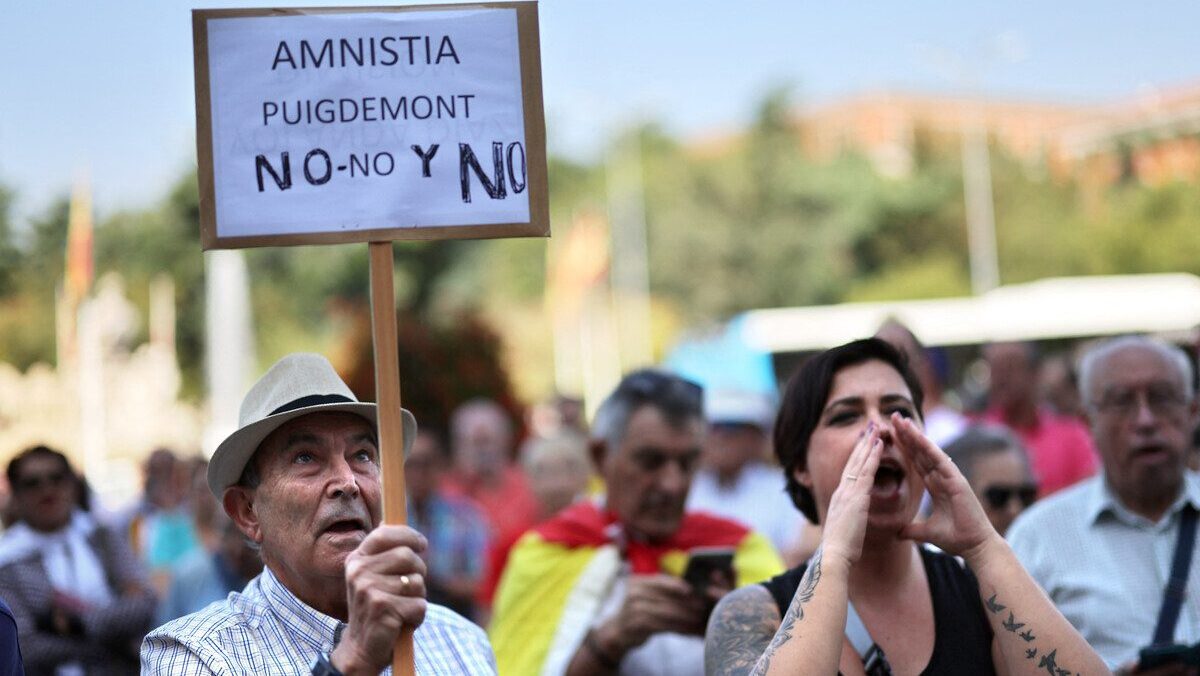
A protester holds a sign reading “Amnesty Puigdemont, no, no and no” during a demonstration against a possible amnesty law for independentists, in front of Madrid’s City Hall, on September 10, 2023.
Photo: by Thomas COEX / AFP
Protesters turned out across Spain on Sunday to show their opposition to a possible amnesty for the leaders of the 2017 attempt to achieve Catalan secession.
Thousands took to the streets in major cities including Seville, Madrid, Málaga, Zaragoza, and Murcia holding up signs calling for the resignation of caretaker president Pedro Sánchez and denouncing possible plans to grant legal pardons to MEP Carles Puigdemont and other Catalan separatists.
Este domingo a las 12 manifestación masiva frente a todos los Ayuntamientos de España contra la amnistía y el chantaje de Puigdemont. No permitamos que subasten la soberanía. Pásalo. pic.twitter.com/76DwuElAZj
— Vito Quiles 🇪🇸 (@vitoquiles) September 7, 2023
🔴 #ÚLTIMAHORA | Miles de personas se manifiestan contra la amnistía y los pactos de Sánchez frente a todos los Ayuntamientos de España. pic.twitter.com/Nxdd97eElr
— Vito Quiles 🇪🇸 (@vitoquiles) September 10, 2023
Agitation for independence from Spain reached a climax in Catalonia in 2017 when Puigdemont, then president of the region, and other separatists carried out an illegal regional referendum on the question of Catalonia remaining part of Spain. Most of the organisers were brought to trial and served prison sentences, though they were subsequently shortened by a pardon from Sánchez.
Puigdemont and two other MEPs have been fugitives from Spanish law since 2017.
The question of amnesty comes at a time when Spain is also at a crossroads. The July elections resulted in a hung parliament and forming a government is a matter of a few votes, particularly those of the Catalan and Basque regional parties, most of which are also separatist in their politics. Puigdemont’s Junts Per Cat is key as it holds seven parliamentary seats, each with a vote. The party is demanding amnesty for those convicted or accused of leading the 2017 referendum.
At the same time, Puigdemont is himself at something of a legal crossroads. In early July, the General Court of the European Union withdrew his immunity as an MEP, as it did for two other Catalan MEPs involved in the 2017 referendum. Now, Puigdemont and the two others are coming up on the deadline to appeal the decision and keep the legal game going, which they are expected to do. Should they not appeal or the appeal be lost (which will take months in any case), they will be subject again to an extradition order, which Spanish media reports, Belgian authorities will be more inclined to follow than the last one, ordered in 2019.
At the same time, the Spanish parliament has until December to form a government, or the country will have to repeat elections.
The centre-right Partido Popular, which won the elections but is just shy of enough votes to easily form a government, has made it clear that it is not willing to go as far as an amnesty to satisfy the Catalans but Sánchez is far less scrupulous. Additionally, his needed coalition partners, the far-left Sumar, have made it clear they are ready to grant an amnesty.
Sumar president Yolanda Diaz, who was the second vice president in the last Sánchez government, visited Puigdemont in Belgium last week.
Spain passed an amnesty law in 1977 as part of the country’s transition to democracy following the forty-year dictatorship of the Franco regime. But opponents of amnesty point out that the context for a potential amnesty for Catalan separatists is completely different from the 1977 law and constitutionally dubious. They claim it would only fan the flame of separatism, further compromise democracy in Spain, and allow separatists to attempt another referendum or similar measure, setting the country, particularly the Catalan region, up for more strife.
